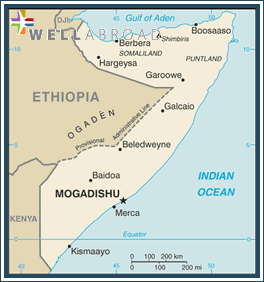|
MOST RECENT ALERTS
There's no recent alert.
|

|
|||||||||||||||
| COUNTRY OVERVIEW | ||||||||||||||||
|---|---|---|---|---|---|---|---|---|---|---|---|---|---|---|---|---|
|
| COUNTRY GENERAL INFORMATION | |||||||
|---|---|---|---|---|---|---|---|
| Language: |
Somali (official), Arabic, Italian, English |
||||||
| Currency: | Somali Shilling (SOS) | ||||||
| Predominant Religions: |
Sunni Muslim |
||||||
| National Holidays: | Foundation of the Somali Republic, 1 July (1960); note - 26 June (1960) in Somaliland | ||||||
| Economic Status: |
Despite the lack of effective national governance, Somalia has maintained a healthy informal economy, largely based on livestock, remittance/money transfer companies, and telecommunications. Agriculture is the most important sector, with livestock normally accounting for about 40% of GDP and about 65% of export earnings. Nomads and semi-pastoralists, who are dependent upon livestock for their livelihood, make up a large portion of the population. |
||||||
| Security: |
no national-level armed forces |
||||||
| US Presence: |
U.S. Embassy in Somalia |
||||||
| Document Requirements: |
A passport is required for travel to Somaliland and Puntland. Both regions require a visa and issue their own at their respective ports of entry. For travel to other parts of Somalia, including Mogadishu, a passport is required; however, there is no established governing authority capable of issuing a universally recognized visa. Air and seaports are under the control of local authorities that make varying determinations of what is required of travelers who attempt to use these ports of entry. Travelers may obtain the latest information on visas as well as any additional details regarding entry requirements from the Permanent Representative of the Somali Republic to the United Nations, telephone (212) 688-9410/5046; fax (212) 759-0651, located at 425 East 61st Street, Suite 702, New York, NY 10021. Persons outside the United States may attempt to contact the nearest Somali embassy or consulate. All such establishments, where they exist, are affiliated with the TFG, whose authority is not established throughout Somalia. Information about dual nationality or the prevention of international child abduction can be found on our web site. For further information about customs regulations, please read our Customs Information sheet. |
||||||
| Major Airports: |
Airports: 67, Airports w/paved runways: 7 Mogadishu International Airport (MGQ/HCMM) |
||||||
| Servicing Airlines: |
|
||||||
| Risks and Precautions: |
US Dept. of State Travel Warning Updated 15 November 2008 The State Department warns US citizens of the risks of travel to Somalia and recommends that American citizens avoid all travel to Somalia. This replaces the Travel Warning dated October 24, 2008 to note terrorist attacks in the regions of Somaliland and Puntland. |
||||||
| Mortality Statistics: |
Infant MR total: 110.97 deaths/1,000 live births |
||||||
| Immunization Indicators: |
Required: None Note: Chloroquine is NOT an effective antimalarial drug in Somalia and should not be taken to prevent malaria in this region. |
||||||
| Infectious Disease Concerns: |
Major Infectious Diseases, degree of risk: high |
||||||
| Overall Quality of Medical Services: |
Medical facilities in Somalia are extremely limited. Travelers should carry personal supplies of medications with them. |
||||||
| Providers in Network: |
|
||||||
| Recent Medical Threats/ Concerns/Warnings: |
There have been outbreaks of cholera in Mogadishu, Kismayo in the south, and Puntland in the northeast. |
||||||
| Communications Info: |
Country Code: +252 |
||||||






